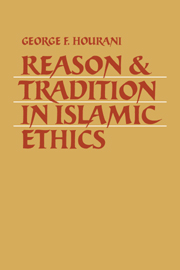Book contents
- Frontmatter
- Contents
- Preface
- Foreword by Michael Marmura
- Conventions
- Titles and locations of the original articles
- Introduction
- 1 Islamic theology and Muslim philosophy
- 2 Ethics in classical Islam: a conspectus
- 3 Ethical presuppositions of the Qurʾān
- 4 ‘Injuring oneself’ in the Qurʾān, in the light of Aristotle
- 5 Two theories of value in early Islam
- 6 Islamic and non-Islamic origin of Muʿtazilite ethical rationalism
- 7 The rationalist ethics of ʿAbd al-Jabbār
- 8 Deliberation in Aristotle and ʿAbd al-Jabbār
- 9 Ashʿarī
- 10 Juwaynī's criticisms of Muʿtazilite ethics
- 11 Ghazālī on the ethics of action
- 12 Reason and revelation in Ibn Ḥazm's ethical thought
- 13 The basis of authority of consensus in Sunnite Islam
- 14 Ibn Sīnā's ‘Essay on the secret of destiny’
- 15 Averroes on good and evil
- 16 Combinations of reason and tradition in Islamic ethics
- Select bibliography
- Index
15 - Averroes on good and evil
Published online by Cambridge University Press: 13 October 2009
- Frontmatter
- Contents
- Preface
- Foreword by Michael Marmura
- Conventions
- Titles and locations of the original articles
- Introduction
- 1 Islamic theology and Muslim philosophy
- 2 Ethics in classical Islam: a conspectus
- 3 Ethical presuppositions of the Qurʾān
- 4 ‘Injuring oneself’ in the Qurʾān, in the light of Aristotle
- 5 Two theories of value in early Islam
- 6 Islamic and non-Islamic origin of Muʿtazilite ethical rationalism
- 7 The rationalist ethics of ʿAbd al-Jabbār
- 8 Deliberation in Aristotle and ʿAbd al-Jabbār
- 9 Ashʿarī
- 10 Juwaynī's criticisms of Muʿtazilite ethics
- 11 Ghazālī on the ethics of action
- 12 Reason and revelation in Ibn Ḥazm's ethical thought
- 13 The basis of authority of consensus in Sunnite Islam
- 14 Ibn Sīnā's ‘Essay on the secret of destiny’
- 15 Averroes on good and evil
- 16 Combinations of reason and tradition in Islamic ethics
- Select bibliography
- Index
Summary
Ibn Rushd (Averroes) devoted most of his efforts as a philosopher to expounding and defending the natural philosophy, psychology and metaphysics of Aristotle, and reconciling with them the doctrines of Islam as he understood them. Reflecting these prominent interests, modern Rushdian scholars have exerted themselves primarily in interpreting his thought in these spheres. Little attention has been given to what he had to say on philosophical questions of value and ethics. Yet it would be surprising if he did not have some well-considered ideas on these questions, in view of his background, education and career on both their Islamic and philosophical sides.
Born into a distinguished family of Malikite lawyers, he must from his earliest years have heard problems of Islamic ethics and law discussed around him in his home. He received a thorough education in Malikite fiqh, and a large part of his paid career in the public service of the Almohad government was spent in appointments to various posts as a qāḍī, including the office of Chief Justice (qāḍị al-jamāʿa) of Córdoba. He also wrote a substantial handbook of Sunnite law, Bidāyat al-mujtahid wa nihāyat al-muqtaṣid. His philosophical education was equally thorough and must have included a study of Plato's Republic and Aristotle's Nicomachean Ethics; and he later wrote commentaries on both these works.
- Type
- Chapter
- Information
- Reason and Tradition in Islamic Ethics , pp. 249 - 269Publisher: Cambridge University PressPrint publication year: 1985

